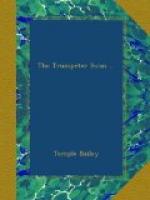She said “good-bye” and crossed by the stepping-stones. The Judge wound up his fishing tackle. The day’s sport resulted in three small “shiners.” But he had enjoyed the day—there had been the stillness and the sunlight, and the good company of Bob Flippin and his daughter Mary.
The dogs followed, and Mary from the other side of the stream watched the little procession, Calvin in the lead with the load, the Judge straight and slim with his fluff of white hair, the three little dogs paddling on their short legs.
“Judge Bannister of Huntersfield,” said Mary Flippin. Then she raised Fiddle high in her arms. “Say Granddad, Fiddle,” she whispered, “say Granddad.”
II
The Flippin farmhouse was wide and rambling. It had none of the classic elegance of the old Colonial mansions, but it had a hall in the middle with the sitting-room on one side and on the other an old-fashioned parlor with a bedroom back of it. The dining-room was back of the sitting-room, and beyond that was the kitchen, and a succession of detached buildings which served as dairy, granary, tool-house and carriage house in the old fashion. There was much sunlight and cleanliness in the farmhouse, and beauty of a kind, for the Flippins had been content with simple things, and Mary’s taste was evidenced in the restraint with which the new had been combined with the old. She and her mother did most of the work. It was not easy in these days to get negroes to help. Daisy, the mulatto, had come down for the summer, but they had no assurance that when the winter came they could keep her. Divested of her high heels and city affectations, Daisy was just a darkey, of a rather plain, comfortable, efficient type. When Mary went in, she was getting supper.
“Has Mother come, Daisy?”
“No, Miss, she ain’, an’ yo’ Poppa ain’ come. An’ me makin’ biscuits.”
“Your biscuits are always delicious, Daisy.”
“An’ me and John wants to go to the movies, Miss Mary. An’ efen the supper is late.”
“You can leave the dishes until mornin’, Daisy.”
Mary smiled and sighed as she went on with Fiddle to her own room. The good old days of ordered service were over.
She went into the parlor bedroom. It was the one which she and Fiddle occupied. She bathed and dressed her baby, and changed her own frock. Then she entered the long, dim parlor. There was a family Bible on the table. It was a great volume with steel engravings. It had belonged to her father’s father. In the middle of the book were pages for births and deaths. The records were written legibly but not elegantly. They went back for two generations. Beyond that the Flippins had no family tree.
Mary had seen the family tree at Huntersfield. It was rooted in aristocratic soil. There were Huguenot branches and Royalist branches—D’Aubignes and Moncures, Peytons and Carys, Randolphs and Lees. And to match every name there was more than one portrait on the walls of Huntersfield.




